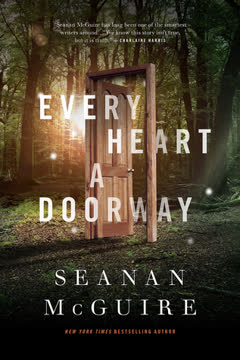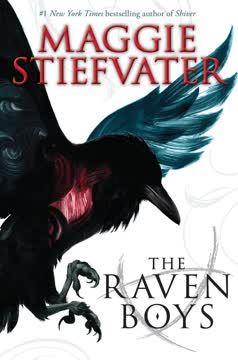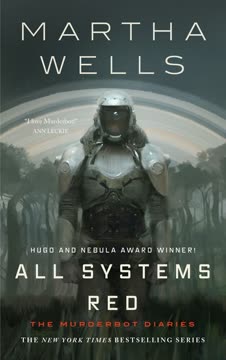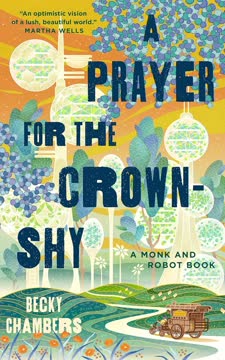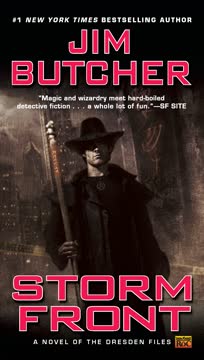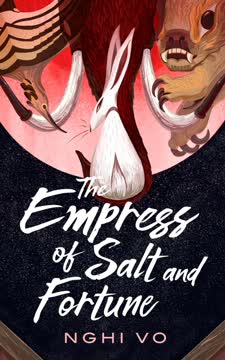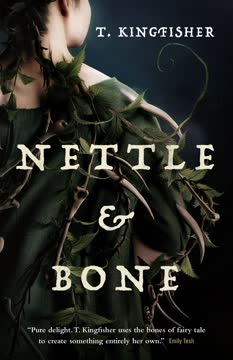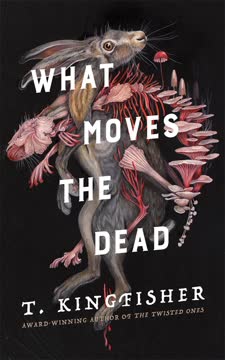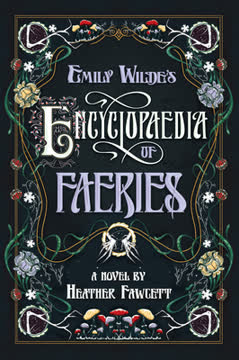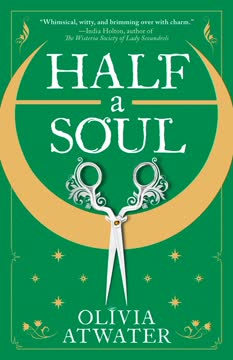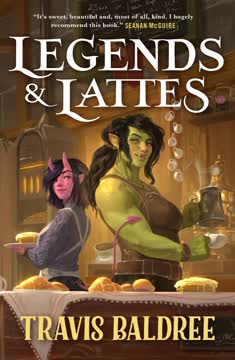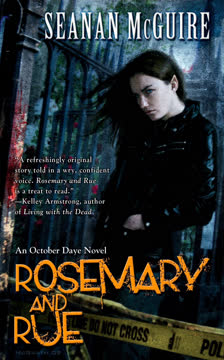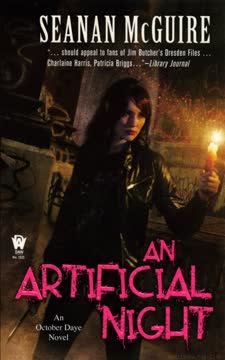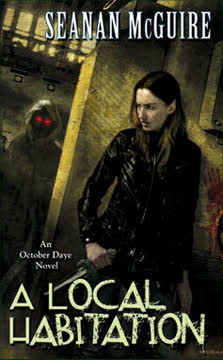Plot Summary
Arrival at the Doorway
Nancy arrives at Eleanor West's Home for Wayward Children, a boarding school for teens who have returned from magical worlds and can't readjust to reality. Her parents, unable to understand her longing for the Underworld she left behind, hope the school will "fix" her. Eleanor, the enigmatic headmistress, recognizes Nancy's pain and welcomes her, hinting at her own experience with other worlds. The manor is both comforting and strange, filled with students who, like Nancy, are haunted by the places they left and the doors that closed behind them. Nancy's arrival is marked by uncertainty, hope, and the ache of exile, setting the stage for her search for belonging.
The School for the Lost
Nancy is introduced to the school's peculiar community, where every student has a story of a door to another world—some logical, some nonsensical, some virtuous, some wicked. The school is a patchwork of trauma and longing, with Eleanor as both caretaker and gatekeeper. Nancy meets Sumi, her unpredictable roommate from a world of candy and chaos, and Kade, a pragmatic boy exiled from Fairyland. The school's rules are simple: respect each other's pain, don't expect to go back, and try to heal. Yet, beneath the surface, everyone is quietly searching for a way home, clinging to hope or learning to let go.
Roommates and Ribbons
Nancy's first days are a whirlwind of adjustment. Sumi's manic energy and disregard for boundaries clash with Nancy's stillness and grief. Their shared room becomes a battleground of color and order, but also a space for fragile connection. Sumi, who lost her own world and family, recognizes Nancy's pain and offers both mischief and comfort. Kade helps Nancy reclaim her identity by providing clothes that feel like home. Through awkward conversations and small acts of kindness, Nancy begins to find her place among the other wayward children, each marked by their own losses and strange gifts.
The Compass of Worlds
Orientation with Lundy, the eternally young therapist, introduces Nancy to the school's taxonomy of portal worlds: Logic and Nonsense, Wickedness and Virtue, and countless minor directions. Each student's journey is unique, but all are united by the trauma of return. Nancy learns that most doors open only once, and the odds of finding a way back are slim. The school is divided between those who want to forget and those who want to remember. Nancy, like most, is desperate to return, but must confront the reality that her longing may never be fulfilled.
Ghosts and Group Therapy
Group therapy becomes a crucible for the students' pain and hope. Nancy listens as classmates recount their adventures and heartbreaks: Jack and Jill's gothic horrors, Kade's exile from Fairyland, Sumi's candy-coated chaos. The sessions reveal the deep bonds and rivalries among the students, as well as the ways their worlds shaped them. Nancy shares her own story of the Underworld, finding solace in being understood. Yet, the group is haunted by the knowledge that most will never go back, and that healing means learning to live with loss.
The Rules of Return
Nancy struggles with the school's central lesson: that most doors never reopen, and that moving on is both necessary and impossible. She learns that some students, like Kade, have accepted their exile, while others, like Sumi and the twins Jack and Jill, are consumed by the desire to return. Eleanor and Lundy offer guidance, but their own stories are marked by regret and compromise. Nancy's stillness, a gift from the Underworld, becomes both her refuge and her prison. The school is a liminal space, suspended between worlds, where every heart aches for a doorway.
Murder in the Halls
The fragile peace of the school is broken when Sumi is found murdered, her hands severed. Panic and suspicion ripple through the students, each fearing they could be next. Nancy, as Sumi's roommate and a newcomer from the Underworld, becomes an object of suspicion. Eleanor and Lundy struggle to maintain order, but the sense of sanctuary is lost. The murder exposes the school's vulnerability and the darkness lurking beneath its surface. Grief and fear bind the students together, even as they begin to turn on one another.
The Blame Game
In the aftermath of Sumi's death, paranoia spreads. Old grudges and rivalries resurface, and students begin to suspect one another. Jack, with her morbid fascination for anatomy, becomes a prime suspect, especially after a second murder claims Loriel, whose eyes are taken. The school's fragile community fractures, with alliances forming and dissolving as fear mounts. Nancy, Kade, and Christopher band together to investigate, determined to protect themselves and uncover the truth. The murders force everyone to confront the darkness within themselves and the cost of survival.
Secrets in the Basement
Nancy, Jack, and Christopher take responsibility for disposing of the bodies, each drawing on the rituals of their lost worlds. In the basement, they use science and magic to honor the dead and seek answers. Christopher's ability to animate skeletons reveals that the murders are not random: someone is harvesting the most precious parts of the students, seeking to build something impossible. The trio's bond deepens as they share secrets and grief, realizing that the killer is one of their own. The basement becomes both a place of horror and a sanctuary for truth.
Skeletons and Revelations
As more bodies are found—each missing a vital part—the students piece together the killer's motive. Jack and Jill's twisted history comes to the fore, revealing a rivalry born of their time in a world of monsters and mad science. Jill, desperate to return to her Master, is building a "skeleton key" from the best parts of her classmates, hoping to force open a door home. The revelation is devastating, especially for Jack, who must confront her sister's monstrosity and her own complicity. The school braces for a final confrontation, knowing that more lives are at stake.
The Monster Among Us
Jill's crimes come to light as she attacks Jack, seeking the final piece for her key. Nancy, Kade, and Christopher race to stop her, but Jill's determination is fueled by desperation and love twisted into obsession. The confrontation in the attic is brutal and heartbreaking, as Jack is forced to kill her own sister to save the others. The cost of survival is steep: innocence is lost, and the bonds of family are shattered. The students are left to reckon with the knowledge that the greatest danger came not from outside, but from within.
The Attic Confrontation
In the attic, surrounded by the remnants of stolen lives, the survivors face Jill and the horror she has wrought. Jack's act of mercy—killing her sister to prevent further deaths—brings an end to the violence, but not to the pain. Seraphina is saved, but the school is forever changed. Jack, carrying Jill's body, opens a door back to the Moors, choosing exile and resurrection over a world that can never understand her. The attic, once a place of secrets and dreams, becomes a tomb for the past and a threshold to uncertain futures.
The Price of Belonging
The aftermath of the murders leaves the school scarred but resilient. Eleanor, weakened by loss, leans on Kade and Nancy to help rebuild. The students mourn their dead and honor their memories, burying the stolen parts with Lundy, who also fell victim to Jill's quest. The school's purpose is reaffirmed: to offer sanctuary to those who have lost their worlds, and to help them find meaning in exile. Nancy, once an outsider, becomes a pillar of the community, her stillness a source of strength for others. The price of belonging is high, but not unbearable.
Doors and Destinies
As the semester ends, Nancy prepares to return home for the holidays, uncertain if she can ever truly belong in the world of the living. Kade, now Eleanor's heir, offers her support and friendship. In a moment of stillness, Nancy finds a letter from Sumi, reminding her that only she can decide how her story ends. The air shifts, and a door appears—a door back to the Underworld, her true home. Nancy faces the ultimate choice: to stay and build a life among the exiles, or to reclaim the world that made her whole.
Home Is a Choice
Nancy chooses to walk through the door, leaving behind the world that never understood her. The pomegranate grove and velvet sky of the Underworld welcome her back, offering the peace and belonging she craved. Her journey is both an ending and a beginning: she is no longer a lost girl, but a woman who has claimed her own destiny. The school endures, a haven for those still searching, and Nancy's story becomes a beacon of hope for all who long for a place to call home. In the end, every heart is its own doorway.
Characters
Nancy Whitman
Nancy is the protagonist, a quiet, asexual girl who spent years in the Underworld, learning the art of stillness and service to the Lord of the Dead. Her return to the "real" world leaves her alienated from her family and desperate to go back. At Eleanor's school, Nancy's reserved nature and unique perspective set her apart, but also allow her to connect with other misfits. Her journey is one of self-acceptance: she learns to honor her own desires, resist others' attempts to "fix" her, and ultimately claim her right to choose her own destiny. Nancy's stillness is both her shield and her strength, and her longing for home drives the emotional arc of the story.
Sumi
Sumi is Nancy's first friend and roommate, a whirlwind of energy from a Nonsense world called Confection. Her manic behavior masks deep pain and a desperate desire to return to the world that made her feel alive. Sumi's kindness and mischief help Nancy acclimate, but her inability to let go of hope becomes her undoing. Sumi's murder is the catalyst for the novel's central mystery, and her absence haunts the survivors. Through Sumi, the story explores the dangers of hope and the cost of refusing to accept loss, as well as the beauty of living authentically, even in exile.
Kade Bronson
Kade is a trans boy who was exiled from Fairyland after being revealed as not the girl the fairies wanted. Practical, resourceful, and compassionate, Kade manages the school's wardrobe and becomes a leader among the students. His own family has rejected him, but he finds belonging at Eleanor's school and becomes her heir. Kade's journey is one of self-acceptance and quiet heroism: he supports Nancy, helps solve the murders, and steps up to guide the community through crisis. Kade embodies the theme that home is not where you come from, but where you are accepted for who you are.
Jack Wolcott
Jack (Jacqueline) is one half of the twin pair Jack and Jill, who returned from a gothic world of mad science and monsters. Jack is brilliant, analytical, and emotionally guarded, shaped by years as Dr. Bleak's apprentice. Her love for her sister is deep but complicated, and she is forced to confront Jill's descent into monstrosity. Jack's willingness to do what is necessary, even when it means killing her own sister, marks her as both tragic and heroic. Her story explores the costs of survival, the limits of loyalty, and the power of self-determination.
Jill Wolcott
Jill (Jillian) is Jack's twin, marked by her time as the favored "daughter" of a vampire lord. She is beautiful, manipulative, and driven by an insatiable desire to return to the Moors. Jill's longing curdles into obsession, leading her to murder her classmates and harvest their body parts in a desperate attempt to build a "skeleton key" to open a door home. Her actions are monstrous, but rooted in the same pain and longing that afflict all the students. Jill's downfall is a cautionary tale about the dangers of unchecked desire and the inability to let go.
Eleanor West
Eleanor is the headmistress of the school, a woman who has spent her life rescuing children lost between worlds. She is wise, eccentric, and deeply empathetic, but also marked by her own longing for the Nonsense world she left behind. Eleanor's compassion is matched by pragmatism: she lies to parents, bends rules, and does what is necessary to protect her charges. Her relationship with Kade is maternal, and she serves as a model of resilience and acceptance. Eleanor's story is one of sacrifice, as she gives others what she was denied, hoping it will one day be enough to earn her own return.
Lundy
Lundy is the school's therapist, a woman aging in reverse after making a bargain in a high Logic, high Wicked world. Trapped in a child's body, she brings both authority and vulnerability to her role. Lundy's guidance is shaped by her own mistakes and the knowledge that some doors never reopen. Her death at Jill's hands is a profound loss for the school, symbolizing the fragility of sanctuary and the cost of unfinished journeys. Lundy's character explores the consequences of bargains, the limits of wisdom, and the pain of exile.
Christopher
Christopher is a boy who returned from a world of dancing skeletons, where he was promised to the Skeleton Girl. He is quiet, kind, and possesses the magical ability to animate bones with his flute. Christopher's connection to death is both literal and metaphorical, allowing him to help honor the dead and uncover the truth behind the murders. His friendship with Nancy and Kade is a source of comfort and solidarity. Christopher's story is about finding beauty in the macabre and embracing the parts of oneself that others find strange.
Seraphina
Seraphina is the most beautiful girl in the school, transformed by her time in a Nonsense world. Her beauty is both a blessing and a curse, attracting envy and danger. Seraphina becomes a target for Jill's scheme, and her rescue is a turning point in the story. She represents the ways in which the gifts of other worlds can become burdens in this one, and the importance of community in protecting the vulnerable.
Angela
Angela is a student who reacts to the murders with suspicion and hostility, particularly toward those who are different. Her accusations against Nancy and Kade reflect the fear and intolerance that can arise in times of crisis. Angela's character serves as a foil to the more accepting students, highlighting the challenges of building community among the exiled and the dangers of scapegoating.
Plot Devices
Portal Worlds and the Compass
The central device of the novel is the existence of countless portal worlds, each tailored to the needs and desires of the children who find them. The "compass" of Logic, Nonsense, Wickedness, and Virtue provides a framework for understanding the diversity of these worlds and the students' experiences. This device allows the story to explore themes of belonging, identity, and the search for home, while also serving as a metaphor for the ways in which trauma shapes individuals differently. The taxonomy of worlds is both a narrative tool and a means of psychoanalysis, helping characters and readers alike make sense of the impossible.
Murder Mystery Structure
The novel's central plot is structured as a murder mystery, with a series of gruesome deaths disrupting the fragile peace of the school. This device heightens tension, forces characters to confront their own darkness, and exposes the fault lines in the community. The mystery is both literal and symbolic: the search for the killer mirrors the students' search for meaning and belonging. The eventual revelation that the killer is one of their own—driven by the same longing that afflicts them all—provides both catharsis and tragedy.
Foreshadowing and Symbolism
The novel is rich in foreshadowing, with early references to the dangers of hope, the uniqueness of each student's gift, and the impossibility of truly returning home. Symbols such as doors, ribbons, and pomegranates recur throughout, representing choice, identity, and the boundary between worlds. Nancy's stillness is both a literal skill and a metaphor for her emotional state, while the severed hands, eyes, and brain of the victims symbolize the theft of agency and the dangers of obsession. The story's resolution—Nancy's choice to walk through her own door—fulfills the promise of these symbols, affirming the power of self-determination.
Narrative Structure
The novel weaves together multiple points of view and narrative threads, reflecting the fractured identities of its characters. The use of group therapy sessions, personal confessions, and shifting alliances creates a tapestry of voices, each contributing to the overarching themes of loss, longing, and resilience. The structure mirrors the experience of exile: disjointed, uncertain, but ultimately moving toward a place of belonging.
Analysis
Every Heart a Doorway is a profound exploration of what it means to be exiled from one's true home—whether that home is a magical world, a lost childhood, or an authentic self. Through its cast of misfits and its taxonomy of portal worlds, the novel interrogates the ways in which trauma, difference, and desire shape our lives. The murder mystery at its core is both a literal threat and a metaphor for the dangers of unchecked longing: the killer is not a monster from outside, but a peer consumed by the same hunger that afflicts them all. The story's greatest strength lies in its empathy: every character is given space to be broken, beautiful, and real. Nancy's journey—from exile to self-acceptance, from stillness to agency—offers hope to anyone who has ever felt out of place. The novel's ultimate lesson is that home is not a place, but a choice, and that every heart is its own doorway.
Last updated:
Review Summary
Every Heart a Doorway receives overwhelmingly positive reviews for its unique premise, diverse characters, and beautiful prose. Readers praise the exploration of identity, belonging, and acceptance. The novella's short length is both appreciated and criticized, with some wishing for more world-building. The murder mystery plot divides opinions, with some finding it weak or predictable. Many reviewers highlight the book's representation of asexual and transgender characters. While a few readers found the story underwhelming, most consider it a captivating and important work in the fantasy genre.
Wayward Children Series
Similar Books
Download PDF
Download EPUB
.epub digital book format is ideal for reading ebooks on phones, tablets, and e-readers.
